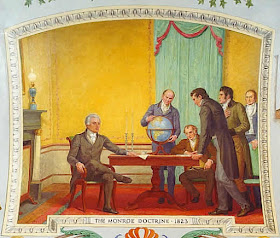
I believe several readers reside in the great state of Missouri (and I spent a few years there myself), so hope they forgive me if I point out some of the abuse that the territory and its residents took during the Missouri Crisis.
Exhibit No. 1 is the poem reproduced above, entitled Maine Not to Be Coupled with the Missouri Question (click to enlarge and read). It was apparently composed by one Timothy Claimright of Brunswick, Maine in January 1820. Mr. Claimright, clearly upset that his state's admission was being held hostage to Missouri's, vented his spleen upon that state, where people "live in a bog . . . they grope in a fog . . . they wallow in mire, O'erwhelm'd with musquitoes . . . Fill'd with agues." Mr. Wainright also took pointed shots at slavery: "They too lazy for work, drive slaves, whom they fear; . . . Tho' lock'd up, they dream of slaves, whom they dread; . . . And without their slaves, how long would it take To shell enough corn to purchase one hake?"
Exhibit No. 2 is a nice summary of contemporary gibes against Missouri assembled by Glover Moore. Spurred by reports of violence in Missouri against restrictionists, northern publications portrayed the territory as a slaveocratic version of Dodge City and Tombstone:
As an aside, the reference in the poem to "a King of her own" is to William King. The half-brother of Preston King, William King was the principal proponent of statehood for Maine and the state's first governor after admission.
Exhibit No. 1 is the poem reproduced above, entitled Maine Not to Be Coupled with the Missouri Question (click to enlarge and read). It was apparently composed by one Timothy Claimright of Brunswick, Maine in January 1820. Mr. Claimright, clearly upset that his state's admission was being held hostage to Missouri's, vented his spleen upon that state, where people "live in a bog . . . they grope in a fog . . . they wallow in mire, O'erwhelm'd with musquitoes . . . Fill'd with agues." Mr. Wainright also took pointed shots at slavery: "They too lazy for work, drive slaves, whom they fear; . . . Tho' lock'd up, they dream of slaves, whom they dread; . . . And without their slaves, how long would it take To shell enough corn to purchase one hake?"
Exhibit No. 2 is a nice summary of contemporary gibes against Missouri assembled by Glover Moore. Spurred by reports of violence in Missouri against restrictionists, northern publications portrayed the territory as a slaveocratic version of Dodge City and Tombstone:
Thereafter Missouri became the target of many a gibe and witticism. . . . Federalist and Clintonian newspapers regaled their readers with hair-raising stories of Missouri mob violence and lawlessness -- accounts of duels, personal encounters with dirk and pistol, St. Louis ladies who wore and wielded dirks, fights between boatmen, broken bones, noses bitten off, attacks by slaveholders on ministers, floggings, and Negro mistresses (one of whom went on a rampage and flogged her white paramour, who thereupon committed suicide in humiliation).
A resident of Pittsburgh who had been considering moving to Missouri took the precaution to write to the editor of the St. Louis Gazette to ask if it was true that the people of St. Louis wore dirks and pistols, "and consequently, a man's life is in continued danger."
As an aside, the reference in the poem to "a King of her own" is to William King. The half-brother of Preston King, William King was the principal proponent of statehood for Maine and the state's first governor after admission.

























